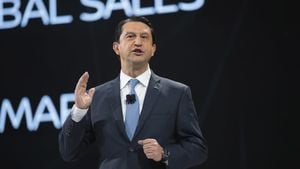Former President Donald Trump, now once again at the helm of American politics, is contemplating powerful tactics to fill his Cabinet without the rigorous challenges typically posed by Senate confirmations. The idea of using recess appointments—a strategy outlined within the U.S. Constitution—has resurfaced as Trump tackles obstacles to his appointments amid partisan tensions.
Senator John Thune, recently elected Senate Majority Leader, indicated possibilities for bypassing traditional confirmation processes for Trump's Cabinet nominees, should negotiations with opponents stall. "We must act quickly and decisively to get the president’s nominees in place as soon as possible, and all options are on the table to make it happen, including recess appointments," Thune posted on X, formerly known as Twitter.
The recess appointment power allows the president to appoint federal officials without Senate confirmation during times when Congress is adjourned. Historically, this provision has been utilized by presidents ranging from Bill Clinton, who made 139 such appointments, to George W. Bush's 171, but neither used the strategy for top Cabinet roles. Barack Obama attempted to use it but was met with judicial setbacks. A significant Supreme Court ruling stipulated the Senate must recess for 10 days before the president can invoke this power, prompting Congress to hold pro-forma sessions to avoid granting the president this ability.
Despite Trump's Republican majority, which includes a 53-47 lead, obstacles remain as dissent grows among party members, especially concerning the nomination of controversial figures. The nomination of former Rep. Matt Gaetz for Attorney General has sparked bipartisan skepticism, with Senator Lisa Murkowski stating, "I don’t think it’s a serious nomination for the attorney general. We need to have a serious attorney general." Similarly, Senator Susan Collins expressed shock at the suggestion of Gaetz as nominee, emphasizing the significance of the "advise and consent" role of the Senate.
Trump's other nominations have also found themselves on shaky ground, such as tapping Robert F. Kennedy Jr. as the head of the Department of Health and Human Services or selecting Tulsi Gabbard for national intelligence director. These moves pose considerable risks of bipartisan pushback, particularly as Gaetz faces historical allegations of misconduct. Critics assert these nominations undermine federal integrity.
Trump's push for recess appointments has been viewed as part of his broader strategy to assert dominance over congressional procedures. "It would take considerable power away from the Senate," past political observers noted, significant as Trump aims for more forceful governance with his revived presidency. This sentiment echoes his past frustrations with the Senate's slow-moving confirmation processes, particularly during his first term.
To facilitate recess appointments, Senate Republicans would need to unite under Thune's leadership, possibly at the cost of lengthy debates and increased scrutiny from opposition Democrats. The apparent rift within GOP ranks on whether to accept the controversial nominations adds another layer of complexity. "Recess appointments could serve as both safeguard and sword—a means to sustain momentum and potentially ram through controversial choices for his administration," stated political analysts, reflecting on the broader cultural divide currently shaping U.S. politics.
Trump's allies assert recess appointments reflect the will of the American people, claiming they facilitate quicker governmental functions. Critics, conversely, argue for the necessity of thorough vetting through Senate hearings to preserve democratic processes. Trump’s ability to adapt and win over party members will be pivotal as the new Congress commences on January 3, 2025.
The looming question now is whether Republicans will concede to the use of recess appointments or if they will prioritize party cohesion by advocating for standard appointment protocols. This strategy will likely influence the overall effectiveness of Trump's proposed nominees and could redefine how U.S. governance operates under his renewed leadership.



